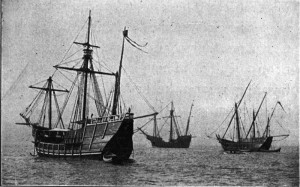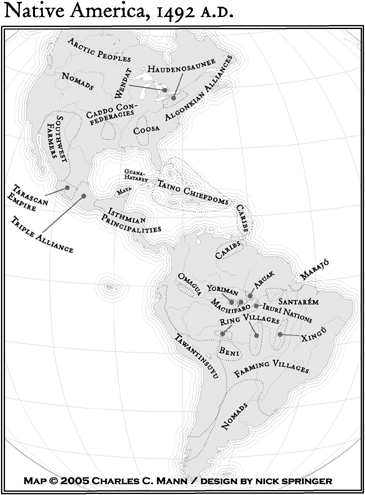This is the second post in a four part series exploring how the story of Orson Scot Card’s book Pastwatch gets readers to play with and explore their own models of the past. The first post discussed the way the book’s claim that we are living in an altered history helps us approach the past as a strange and peculiar set of events. In this post I describe the next section of the book, where we learn about what the “real” past was. I suggest that this extensive counterfactual argument has significant value for supporting the kind of causal argumentation and appeals to evidence that historians make.
Columbus’s original intent

In the “original past” (the one which we have never experienced) Christopher Columbus lead a Crusade that locked all of Europe and the Islamic world in a bloody conflict which eventually resulted in the western world being devastated and weakened. Apparently, the past had been altered to avert an Aztec takeover of Europe.
The book spends a chapter or two listening in on arguments between different Pastwatch researchers arguing about the evidence available to them from the TrueViewII. The Pastwatch researchers argue the implications of a series of technological breakthroughs in metallurgy and shipbuilding among Meso-Americans. They argue about how different models of interaction between Portuguese explorers who would have discovered Brazil and indigenous peoples could have changed the role diseases like smallpox played in history. After exploring and arguing about what exactly they can know about a series of events in an erased past, the Pastwatchers come to the conclusion that in the “original past” a sort of super-Aztec empire had discovered Europe. Ultimately, this super Aztec empire conquered a Europe decimated by the extensive and bloody war Columbus had been responsible for starting over control of Constantinople. This original past resulted in human sacrifice across Europe and untold suffering.
The researchers of Pastwatch decide that in the “original future” (the future that never got a chance to unfold) people like them had decided to edit the past in an attempt to bring about a more peaceful future. The history of devastation, colonization, slavery, and exploitation in the Americas was apparently the unforeseen outcome of this attempt to rewrite the past. The researchers at Pastwatch have made it their mission to meddle with history again, and try to create an even better past.
Causal arguments and Historical Evidence in Counter-factual thought

This section of the book gets into the heart of the genre of alternate history writing. It asks readers to think through what would have happened if Columbus had started a crusade against Constantinople. The value here comes in two parts: First, the story is getting us to think more deeply about causation. What chain of events lead to our current world and how would that chain of events have turned out differently with this change? Importantly, the way we argue about that chain is to appeal to actual or pretend historical evidence. In the case of Pastwatch, Orson Scot Card draws from historical information and materials related to both Columbus’s life and the state of society and technology in Pre-Colonial Meso-America. For the purposes of this post, I am not particularly interested in the credibility of that evidence. I would not offer this book to anyone interested in learning about this period of history. The value of the book is not its factual content. The value of the book is the way its characters construct and critique arguments about how the world would have turned out differently given a set of assertions. The characters must appeal to evidence to play with the causal models they are carrying around about this period of history.
History is always (at its best) a useful fiction
Our current historical narrative is always a useful fiction. The narrative of our past is a kind of gross over-simplification based on a interpretation and conjecture grounded in a specific set of limited evidence (say that ten times!). One of the biggest achievements a Historian can accomplish is to succeed in overturning part of that useful fiction. The misinformed call these historians “revisionists”. To accomplish this work historians need to have the kind of imagination that gets them to look for totally new kinds of discrepant evidence, or find a new way to interpret an existing set of evidence that requires us to reconsider our history. You know, the history we thought was inevitable? One of the most valuable components of Pastwatch is the way it invites this kind of historical imagination.

Dang, another one for the Amazon Wishlist.
The plot, as you describe it, sounds like it was influenced by the kind of narratives that might be spun out of an empire-building game like Civilization, complete with technology trees. Does Card say anything about that?
Interestingly Civilization makes it into the acknowledgements!
“to sid meier, a complaint, for making the game civilization, which was very good at keeping me unproductive”
It is interesting to think about how the structure of the game might possibly play a role in the nature of the narrative and potentily could help create a recptive audiance for this kind of narrative.